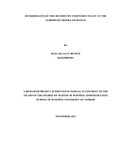| dc.contributor.author | Rotich, Rael J | |
| dc.date.accessioned | 2013-11-13T10:50:50Z | |
| dc.date.available | 2013-11-13T10:50:50Z | |
| dc.date.issued | 2013-11 | |
| dc.identifier.citation | Degree Of Master of Business Administration (MBA) | en |
| dc.identifier.uri | http://erepository.uonbi.ac.ke:8080/xmlui/handle/123456789/58887 | |
| dc.description | A research project submitted in partial fulfillment to the award of the Degree Of Master Of Business Administration, School Of Business, University Of Nairobi | en |
| dc.description.abstract | Deciding whether to list company on the Nairobi Stock Exchange (NSE) is an important decision. Joining one of the NSE‟s markets provides a company with the opportunity to benefit from improved access to capital, increased global profile and access to liquidity. The NSE facilitates, among others, a principal activity in the financial system. It enables firms to gain access to long-term investable funds by issuing company shares and debt securities to the public. Currently at the NSE, only 61 companies are listed, to raise the additional capital firms opt to other sources of capital other than listing in the stock exchange. The research objective of this study is to identify the factors that determine company‟s listing decision on the NSE. The study adopted descriptive method was adopted because it ensured complete description of the situation, making sure that there is minimum bias in the collection of data .The target population in this study of 20 companies was selected based on company size as required by the NSE listing requirements where a company must have an asset base of one hundred million shillings. The population selected comprised of large private companies as well as those listed on the NSE. Primary data was collected to gather qualitative information from the target respondents outlining issues relevant to the study. The study used quantitative techniques in analysing the data. Discriminant analysis was used to determine which variable(s) are the best predictors of companies‟ decisions to list at the NSE. The study concluded that stock market liquidity, volatility, political environment and the legal and regulatory framework and political factors had a significant influence on company listing decisions. The study also concluded that volatility of stock returns affected the return on investment and growth by disturbing the average portfolio risk significantly influencing company listing in stock market. There existed positive relationship between stock market development and company growth hence the need to company expansion influence company‟s listing decision in the stock market. The high volatility would have a negative influence on company listings as would be the case when it is measured using the standard deviation of annualized returns. This study concluded that the higher the index the more likely companies would be to list.
. | en |
| dc.language.iso | en | en |
| dc.publisher | University of Nairobi | en |
| dc.title | Determinants of the Decision by Companies to List at the Nairobi Securities Exchange | en |
| dc.type | Thesis | en |
| local.publisher | School of Business | en |

